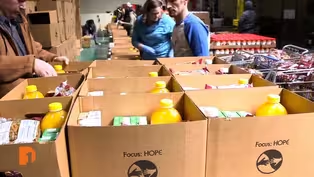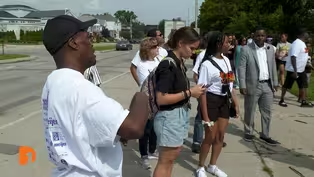
Detroiters raise concerns about city’s ShotSpotter expansion
Clip: Season 8 Episode 7 | 6m 5sVideo has Closed Captions
Controversy surrounding Detroit’s ShotSpotter expansion raises concerns among residents.
Detroit's expansion of the ShotSpotter system has ignited a wave of controversy as citizens demand answers about the technology's impact on their community and call for more transparency from both the Detroit Police Department and the California-based company, Sound Thinking. Producer Will Glover talks with BridgeDetroit reporter Malachi Barrett about the concerns residents are raising.
Problems playing video? | Closed Captioning Feedback
Problems playing video? | Closed Captioning Feedback
One Detroit is a local public television program presented by Detroit PBS

Detroiters raise concerns about city’s ShotSpotter expansion
Clip: Season 8 Episode 7 | 6m 5sVideo has Closed Captions
Detroit's expansion of the ShotSpotter system has ignited a wave of controversy as citizens demand answers about the technology's impact on their community and call for more transparency from both the Detroit Police Department and the California-based company, Sound Thinking. Producer Will Glover talks with BridgeDetroit reporter Malachi Barrett about the concerns residents are raising.
Problems playing video? | Closed Captioning Feedback
How to Watch One Detroit
One Detroit is available to stream on pbs.org and the free PBS App, available on iPhone, Apple TV, Android TV, Android smartphones, Amazon Fire TV, Amazon Fire Tablet, Roku, Samsung Smart TV, and Vizio.
Providing Support for PBS.org
Learn Moreabout PBS online sponsorship(upbeat music) - Bring us up to speed on what ShotSpotter is and I guess what the latest DPD is doing with the technology.
- So ShotSpotter is a gunshot detection technology that's offered by a private company based out of California known as SoundThinking.
ShotSpotter is the name of the audio surveillance tool.
Generally the idea is they set up these listening devices in neighborhoods to hear gunfire sounds.
When they pick something up, they send an alert to the police and ideally that will help police get a better idea of where gunshots are happening throughout the city.
In Detroit, it's been here since March of 2021 and there were contracts that were approved last summer by the city council to expand the city's relationship.
Originally this kind of started out as a pilot program in really just kind of two police precincts.
The council approved a $7 million contract that expands that now to I believe 12 police precincts throughout the city.
- How accurate is the device itself?
- ShotSpotter says that they are accurate up to 82 feet.
They are able to track the location of a gunshot supposedly.
So that will actually kind of help further kind of pinpoint where an area is.
The question of how accurate is it in practice I think is still an open one.
We received some data from ShotSpotter itself, a scorecard that basically shows what the accuracy rate was for 2021 and the first part of 2022.
It took us a year to get that information through a Freedom of Information Act request.
- You had to FOIA?
- We had to FOIA for that.
The data was not released.
And I think this is kind of part of the ongoing criticism and controversy around this technology is like the transparency around how well it's working, how we even determine what success looks like I think has changed a little bit as we've talked about this in these community conversations and from the police.
But in terms of like, there's been 35,000 some alerts so far this year.
So could you say that that's 35,000 gunshots?
I think it's hard to say based on the accuracy information that we have.
So the data that we got showed that 99% of the alerts were actually accurate based on a couple of different, I mean there were a limited number of false positives where the system will say something is gunfire that really isn't, or missed locations.
But in the vast majority of cases, ShotSpotter itself is saying that their technology is really accurate and they're actually obligated to meet a 90% threshold under that contract with the city.
- Basically, if they're supposed to reach a 90% threshold and they're reporting 99%, is there any independent body to verify what the company's report of their success has been?
Because it seems kind of obvious that if they're auditing themselves essentially, of course they're going to meet the threshold.
- So the way that these mistakes are reported, it has to come from DPD to ShotSpotter.
So a police officer will say "Hey, we showed up at a scene, there wasn't any evidence of a gunshot.
We think that this was a mistake."
Or "We showed up at this place and actually the gunshot happened a block over, so the location was inaccurate."
That's really the only way that that can get tagged in the first place.
So there's concern that we might be missing or this doesn't offer kind of a full and complete picture of what the accuracy looks like because you're already getting kind of only the things that police are able to prove as a mistake.
And then there has been no independent third party analysis in Detroit.
And what we found in other cities, when there is a third party analysis, for example, in Chicago, which is one of the bigger cities to be using this technology, the vast majority of these alerts couldn't be connected to any crime.
So in most cases, I think it's hard to say.
From the other aspect of what are we actually getting out of this technology, what are we solving here?
I think it's hard to say that it's reducing crime or even leading to arrests and convictions and prosecutions of gun-related crime, which was early on talked about as one of like really the key benefits of this program.
- Why is it so difficult to get the data from either SoundThinking or the ShotSpotter company or DPD themselves?
- Yeah, I don't really know.
I think that's a really good question because this data is supposed to be owned by the city of Detroit.
And as you said, this is a taxpayer funded program.
It's obligated to be released to the public.
The Board of Police Commissioners, you know, the civilian oversight body that is kind of in charge of creating accountability for the police, they're obligated to receive weekly, I believe, might be quarterly reports.
They're supposed to receive regular reporting on the accuracy rate of ShotSpotter.
And they haven't received any of that.
- They haven't received any?
- They haven't received any reports.
Board secretary told me that they've never received a report on the accuracy.
- What is DPD say about how they're using the system?
Are they saying it's helpful?
Have they said it's helped them solve more crimes?
What are they saying?
- What kind of comes next in this is better understanding what our expectations for ShotSpotter should be because that conversation I think has changed quite a bit since it originally was unveiled.
- I don't think we should look at ShotSpotter as an either or, it's an and.
It's an and community investment.
It's an and to all these other things that we're doing with the police department.
It's and transparency.
So it's not either or, but it's a tool.
It's simply a tool that alerts us as a police agency when someone is firing a gun in our community.
- Police Chief James White has said that just even the presence of these things should make shooters think twice about firing a gunshot within the area.
Since then, I think we've seen the police transition more to talking about how it helps them collect evidence that will help them solve crimes that lead to recovery of guns and convictions for homicides and other kind of gun related crimes.
Focus: HOPE expands seniors food program with 43 new sites
Video has Closed Captions
Clip: S8 Ep7 | 6m 31s | The Food for Seniors program provides food boxes to senior citizens 60 years and older. (6m 31s)
One Detroit Weekend: August 18, 2023
Video has Closed Captions
Clip: S8 Ep7 | 2m 29s | Cecelia Sharpe and Peter Whorf share what you can do around Detroit this weekend. (2m 29s)
Peace & Prosperity Youth Action Movement promotes leadership
Video has Closed Captions
Clip: S8 Ep7 | 6m 34s | Peace & Prosperity Youth Action Movement promotes youth leadership at Neighborhoods Day. (6m 34s)
Providing Support for PBS.org
Learn Moreabout PBS online sponsorship
- News and Public Affairs

Top journalists deliver compelling original analysis of the hour's headlines.

- News and Public Affairs

FRONTLINE is investigative journalism that questions, explains and changes our world.












Support for PBS provided by:
One Detroit is a local public television program presented by Detroit PBS


